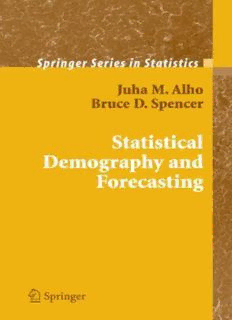Table Of ContentP1:MRM/SJS P2:MRM
SVUS004-Alho&Spencer May3,2005 16:11
Springer Series in Statistics
Advisors:
P.Bickel,P.Diggle,S.Fienberg,
U.Gather,I.Olkin,S.Zeger
i
P1:MRM/SJS P2:MRM
SVUS004-Alho&Spencer May3,2005 16:11
Juha M. Alho and Bruce D. Spencer
Statistical Demography
and Forecasting
With 33 Illustrations
iii
P1:MRM/SJS P2:MRM
SVUS004-Alho&Spencer May19,2005 11:43
JuhaAlho BruceSpencer
DepartmentofStatistics DepartmentofStatistics
UniversityofJoensuu NorthwesternUniversity
Joensuu,Finland Evanston,IL60208
USA
LibraryofCongressControlNumber:2005926699(hardcover)
LibraryofCongressControlNumber:2005927649(softcover)
ISBN10:0-387-23530-2(hardcover) Printedonacid-freepaper.
ISBN13:978-0387-23530-1(hardcover)
ISBN10:0-387-22538-2(softcover)
ISBN13:978-0387-22538-8(softcover)
(cid:1)C 2005SpringerScience+BusinessMedia,Inc.
Allrightsreserved.Thisworkmaynotbetranslatedorcopiedinwholeorinpartwithoutthewritten
permissionofthepublisher(SpringerScience+BusinessMedia,Inc.233SpringStreet,NewYork,
NY10013,USA),exceptforbriefexcerptsinconnectionwithreviewsorscholarlyanalysis.Use
in connection with any form of information storage and retrieval, electronic adaptation, computer
software,orbysimilarordissimilarmethodologynowknownorhereafterdevelopedisforbidden.
Theuseinthispublicationoftradenames,trademarks,servicemarks,andsimilarterms,evenifthey
arenotidentifiedassuch,isnottobetakenasanexpressionofopinionastowhetherornottheyare
subjecttoproprietaryrights.
PrintedintheUnitedStatesofAmerica. (TB/MVY)
9 8 7 6 5 4 3 2 1 SPIN11011019(hardcover) SPIN11013662(softcover)
springeronline.com
iv
P1:MRM/SJS P2:MRM
SVUS004-Alho&Spencer May3,2005 16:11
ToIrjaandDonna
v
P1:MRM/SJS P2:MRM
SVUS004-Alho&Spencer May12,2005 8:32
Preface
Statistics and demography share important common roots, yet as academic dis-
ciplines they have grown apart. Even a casual survey of leading journals shows
thatcross-referencesarerare.Thisisunfortunate,becausemanysocialproblems
callforamulti-disciplinaryapproach.Bothstatisticsanddemographyareneces-
saryingredientsinanyseriousanalysisofthesustainabilityofpensionorhealth
care systems in the aging societies, in the assessment of potential inequities of
formula-based allocations to local governments, in the estimation of the size of
elusive populations such as drug users, in the investigation of the consequences
ofsocialillssuchasunemployment,andsoforth.Thisbookwaswrittentobring
togethermuchofthebasicstatisticaltheoryandmethodologyforestimatingand
forecastingpopulationgrowthanditscomponentsofbirths,deaths,andmigration.
Althoughrelativelysimplemathematicalmethodshavetraditionallybeenusedto
assessdemographictrendsandtheirroleinthesociety,useofmodernstatistical
methodsofferssignificantadvantagesformoreaccuratelymeasuringpopulation
andvitalrates,forforecastingthefuture,andforassessingtheuncertaintyofthe
demographicestimatesandforecasts.
Forstatisticiansthebookprovidesauniqueintroductiontodemographicprob-
lems in a familiar language. For demographers, actuaries, epidemiologists, and
professionals in related fields the book presents a unified statistical outlook on
both classical methods of demography and recent developments. The book pro-
vides a self-contained introduction to the statistical theory of demographic rates
(births,deaths,migration)inamulti-statesetting.Thebookhasadualcharacter.
Ontheonehand,itisamonographthatcanbeconsumedbyalonereader.There
are many results that have appeared in journals or working papers only. Some
appear here for the first time. The book is also useful as a classroom text, and
includes exercises and complements to explore special topics in detail without
interruptingtheflowofthetext.Morethanhalfofthebookisreadilyaccessible
to undergraduates, but to fully benefit from the complete text may require more
maturity.
Joensuu,Finland JuhaM.Alho
Evanston,Illinois,USA BruceD.Spencer
vii
P1:MRM/SJS P2:MRM
SVUS004-Alho&Spencer May3,2005 16:11
Acknowledgments
Thisbookwassome15yearsinthemaking.Wearegratefultomanycolleaguesand
studentsforadvice,encouragementandhelpfulcomments,bothspecificandgen-
eral.WethankBillBell,KatieBench,HenryBienen,PetraCan,TomEspenshade,
Steve Fienberg, Marty Frankel, Olavi Haimi, Joan Hill, Jan Hoem, Jeff Jenkins,
JayKadane,AnneKearney,NicoKeilman,NathanKeyfitz,DonnaKostanich,Bill
Kruskal,EsaLa¨a¨ra¨,JukkaLassila,RonLee,RistoLehtonen,ChijienLin,Lincoln
Moses,FredMosteller,TomMule,JukkaNyblom,ErkkiPahkinen,Pa¨iviPartanen,
RitaPetroni,JiaheQian,DaveRaglin,ChrisRhoads,GreggRobinson,MikkoA.
Salo,thelateI.RichardSavage,EricSchindler,TomSeverini,EricSong,Richard
Suzman, Shripad Tuljapurkar, Tarmo Valkonen, Jim Vaupel, Nic van de Walle,
LarryWu,SandyZabell.ShelbyHabermanandMaryMulrywentaboveandbe-
yondthecallinclosereadingandadvice.Responsibilityforremainingerrors,of
course,remainswiththeauthors.
DuringpreparationofthebookwereceivedfinancialsupportfromU.S.National
Institute on Aging grant R01 AG10156-01A1 to Northwestern University; The
SearleFundgrantonLimitsofEmpiricalSocialScienceforPolicyAnalysis,to
Northwestern University; U.S. Census Bureau contract 50-YABC-7-66020 with
Abt,Associates;AcademyofFinlandGrants8684,41495,and201408,Statistics
FinlandGrant5012,andEuropeanCommissionGrantHPSE-CT-2001-00095to
UniversityofJoensuu;andEuropeanCommissionGrantQLRT-2001-02500tothe
ResearchInstituteoftheFinnishEconomy.
Joensuu,Finland JuhaM.Alho
Evanston,Illinois,USA BruceD.Spencer
ix
P1:MRM/SJS P2:MRM
SVUS004-Alho&Spencer May3,2005 16:11
Contents
Preface vii
Acknowledgments ix
ListofExamples xix
ListofFigures xxv
Chapter1. Introduction 1
1. RoleofStatisticalDemography 1
2. GuidefortheReader 4
3. StatisticalNotationandPreliminaries 4
Chapter2. SourcesofDemographicData 9
1. Populations:OpenandClosed 9
2. DeFactoandDeJurePopulations 11
3. CensusesandPopulationRegisters 15
4. LexisDiagramandClassificationofEvents 16
5. RegisterDataandEpidemiologicStudies 19
5.1. EventHistoriesfromRegisters 19
5.2. CohortandCase-ControlStudies 19
5.3. AdvantagesandDisadvantages 20
5.4. Confounding 22
6. SamplinginCensusesandDualSystemEstimation 24
ExercisesandComplements 27
Chapter3. SamplingDesignsandInference 31
1. SimpleRandomSampling 32
2. SubgroupsandRatios 35
3. StratifiedSampling 36
3.1. Introduction 36
3.2. StratifiedSimpleRandomSampling 37
3.3. DesignEffectforStratifiedSimpleRandomSampling 38
3.4. Poststratification 39
4. SamplingWeights 40
4.1. WhyWeight? 40
xi
P1:MRM/SJS P2:MRM
SVUS004-Alho&Spencer May3,2005 16:11
xii Contents
4.2. FormingWeights 41
4.3. Non-ResponseAdjustments 43
4.4. EffectofWeightingonPrecision 45
5. ClusterSampling 46
5.1. Introduction 46
5.2. SingleStageSamplingwithReplacement 47
5.3. SingleStageSamplingwithoutReplacement 47
5.4. Multi-StageSampling 49
5.5. StratifiedSamples 50
6. SystematicSampling 52
7. DistributionTheoryforSampling 53
7.1. CentralLimitTheorems 53
7.2. TheDeltaMethod 55
7.3. EstimatingEquations 56
8. ReplicationEstimatesofVariance 61
8.1. JackknifeEstimates 61
8.2. BootstrapEstimates 62
8.3. ReplicationWeights 63
ExercisesandComplements 64
Chapter4. WaitingTimesandTheirStatistical
Estimation 71
1. ExponentialDistribution 71
2. GeneralWaitingTime 76
2.1. HazardsandSurvivalProbabilities 76
2.2. LifeExpectanciesandStablePopulations 79
2.2.1. LifeExpectancy 79
2.2.2. LifeTablePopulationsandStablePopulations 81
2.2.3. ChangingMortality 82
2.2.4. BasicsofPensionFunding 84
2.2.5. EffectofHeterogeneity 85
2.3. Kaplan-MeierandNelson-AalenEstimators 85
2.4. EstimationBasedonOccurrence-ExposureRates 88
3. EstimatingSurvivalProportions 91
4. ChildbearingasaRepeatableEvent 93
4.1. PoissonProcessModelofChildbearing 93
4.2. SummaryMeasuresofFertilityandReproduction 96
4.3. PeriodandCohortFertility 101
4.3.1. CohortFertilityisSmoother 101
4.3.2. AdjustingforTiming 103
4.3.3. EffectofParityonPurePeriodMeasures 104
4.4. MultipleBirthsandEffectofPregnancyonExposureTime 106
5. PoissonCharacterofDemographicEvents 107
6. SimulationofWaitingTimesandCounts 109
ExercisesandComplements 110
P1:MRM/SJS P2:MRM
SVUS004-Alho&Spencer May3,2005 16:11
Contents xiii
Chapter5. RegressionModelsforCountsandSurvival 117
1. GeneralizedLinearModels 118
1.1. ExponentialFamily 118
1.2. UseofExplanatoryVariables 119
1.3. MaximumLikelihoodEstimation 119
1.4. NumericalSolution 120
1.5. Inferences 121
1.6. DiagnosticChecks 122
2. BinaryRegression 123
2.1. InterpretationofParametersandGoodness
ofFit 123
2.2. ExamplesofLogisticRegression 124
2.3. ApplicabilityinCase-ControlStudies 129
3. PoissonRegression 130
3.1. InterpretationofParameters 130
3.2. ExamplesofPoissonRegression 131
3.3. Standardization 133
3.4. LoglinearModelsforCapture-RecaptureData 136
4. OverdispersionandRandomEffects 138
4.1. DirectEstimationofOverdispersion 139
4.2. MarginalModelsforOverdispersion 139
4.3. RandomEffectModels 140
5. ObservableHeterogeneityinCapture-RecaptureStudies 143
6. BilinearModels 146
7. ProportionalHazardsModelsforSurvival 150
8. HeterogeneityandSelectionbySurvival 154
9. EstimationofPopulationDensity 156
10. SimulationoftheRegressionModels 158
ExercisesandComplements 159
Chapter6. MultistateModelsandCohort-Component
Book-Keeping 166
1. MultistateLife-Tables 167
1.1. NumericalSolutionUsingRunge-KuttaAlgorithm 167
1.2. ExtensiontoMultistateCase 168
1.3. Duration-DependentLife-Tables 172
1.3.1. HeterogeneityAttributabletoDuration 172
1.3.2. FormsofDuration-Dependence 173
1.3.3. AspectsofComputerImplementation 174
1.3.4. PolicySignificanceofDuration-Dependence 175
1.4. NonparametricIntensityEstimation 175
1.5. AnalysisofNuptiality 177
1.6. AModelforDisabilityInsurance 179
2. LinearGrowthModel 180
2.1. MatrixFormulation 180
Description:Sustainability of pension systems, intergeneration fiscal equity under population aging, and accounting for health care benefits for future retirees are examples of problems that cannot be solved without understanding the nature of population forecasts and their uncertainty. Similarly, the accuracy

